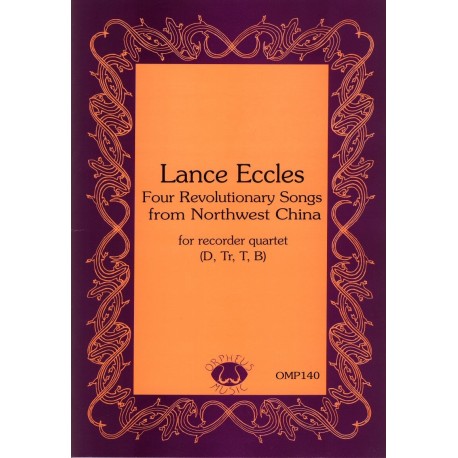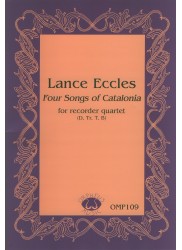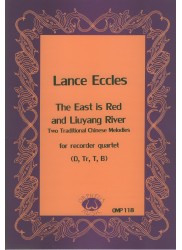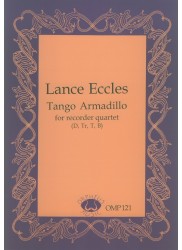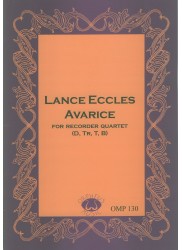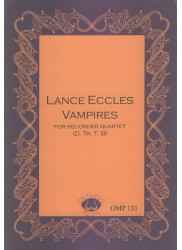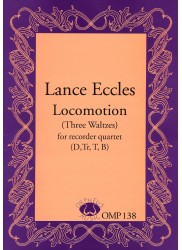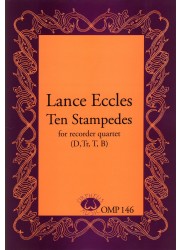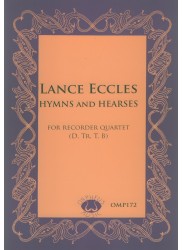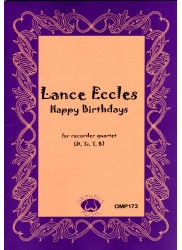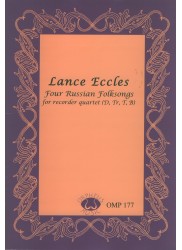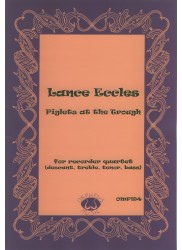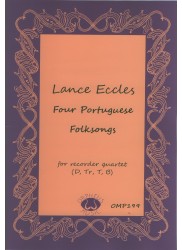No products
Prices are tax included
Four Revolutionary Songs from North West China
OMP140.pdf
PLEASE NOTE - DOWNLOADABLE PDF VERSION
Composer: Eccles - Lance
Instrumentation: Descant - Treble - Tenor - Bass
Period/genre: Folk/Trad
Grade: Moderate
More info
*Contemporary Pieces.* Attractive set of Chinese melodies in clever oriental sounding arrangements.
Please note that due to the automated delivery of virtual products including pdf downloads, PayPal payment is required at the checkout - we are unable to accept the cheque payment method for these items.
_Score 9 pp. Parts 3 pp. Downloadable PDF file - 746 Kb._
OMP118 Lance Eccles, The East is Red and Liuyang River (Two Traditional Chinese Melodies)
OMP095 Lance Eccles, Four Korean Folksongs
OMP140 Lance Eccles, Four Revolutionary Songs from Northwest China
These collections were arranged by Lance Eccles, an Australian university lecturer in Chinese who also plays the recorder. The two Chinese collections (The East is Red and Liuyang River and Four Revolutionary Songs from Northwest China) comprise songs widely sung during the Cultural Revolution.
"The East is Red" was the most popular patriotic song during that time, with "Three Rules of Discipline and Eight Points for Attention" in the Four Revolutionary Songs a close second. Although these two songs, plus "Army and People Together" sound martial, others - such as "Red Bloom the Mountain Lilies" and "Embroidering Words of Gold" - are much more lyrical and flowing.
To create his arrangements, Eccles has taken these pentatonic Chinese tunes and arranged them with Western harmonies, a practice common in China itself starting in the 20th century.
Because the songs are short, he has used several devices to create longer pieces. Examples of these devices are: putting the melody in a different part, creating more complex harmony parts on repeats of the melody, introducing more rhythmic complexity, changing the texture by dropping a part for one repeat of the tune, creating canons, and temporarily changing the mode. With these techniques, he successfully maintains interest through multiple variations.
He uses the same techniques to arrange the tines in Four Korean Folksongs, which includes "Arirang", the most famous of all Korean folk songs.
The Kalamazoo Recorder Players found the arrangements in all three collections interesting, tuneful and worth playing. Although the publisher designated these arrangements as "moderate" in difficulty, there are rhythmic and high-range issues with some of the pieces. Eccles' website lists the Four Korean Folksongs as being for the more advanced intermediate consort, which seems an apt description for the other two collections as well.
Judy Whaley and the Kalamazoo Recorder Players, American Recorder, September 2006
OMP140 Lance Eccles, Four Revolutionary Songs from Northwest China
No.1: "Three Rules of Discipline and Eight Points for Attention", is much brighter than it may sound. In two flats and marked to be played 'briskly' it has very few rests and berates one with joyous fervour in a simple hexatonic music from the beginning to end. The opening eight-bar tune given out in octaves gets two more, harmonised repetitions before some discussion ensues, wound up with a forceful assertion of the two opening bars.
No.2: "Red Bloom the Mountain Lilies", with one sharp for signature, and its czardas-like alternation of slow and fast, is a gentle contrast to the preceding. The descant, which had soloed to begin with, sits out in the third repetition of the tune, to re-appear vigorously with top D's and all in the fast section.
No.3: "Embroidering Words of Gold", has no key signature and is made from the simplest of materials. The descant again sits out the third verse of the six of its sixteen-bar melody.
No.4 Army and People together, is fast with lots of lively articulation and presents its tune nine times over, with different configurations for each, including the now mandatory retiring of the descant for verse three. Without a dynamic in sight, Lance Eccles, of whose oeuvre thirty-two examples are described in the advertisement at the back, has contrived to dragoon his quartet into some exciting manoeuvres with distinctive harmonies, full use if the recorders' ranges and very little let-up.
Paul Clark, The Recorder Magazine, XX-XX
30 other products in the same category:
Reference: OMP109
Brand: Orpheus Music
Four Songs of Catalonia
Composer: Eccles - Lance Instrumentation: Descant - Treble - Tenor - Bass...
In StockReference: OMP109.pdf
Brand: Orpheus Music
Four Songs of Catalonia
PLEASE NOTE - DOWNLOADABLE PDF VERSION Composer: Eccles - Lance...
$22.00 -20%In StockReference: OMP118
Brand: Orpheus Music
The East is Red and Liuyang River
Composer: Eccles - LanceInstrumentation: Descant - Treble - Tenor -...
In StockReference: OMP118.pdf
Brand: Orpheus Music
The East is Red and Liuyang River
PLEASE NOTE - DOWNLOADABLE PDF VERSION Composer: Eccles -...
$17.50 -20%In StockReference: OMP121
Brand: Orpheus Music
Tango Armadillo
Composer: Eccles - LanceInstrumentation: Descant - Treble - Tenor -...
In StockReference: OMP121.pdf
Brand: Orpheus Music
Tango Armadillo
PLEASE NOTE - DOWNLOADABLE PDF VERSION Composer: Eccles -...
$16.00 -20%In StockReference: OMP129
Brand: Orpheus Music
Ruins
Composer: Eccles - LanceInstrumentation: Descant - Treble - Tenor -...
In StockReference: OMP129.pdf
Brand: Orpheus Music
Ruins
PLEASE NOTE - DOWNLOADABLE PDF VERSION Composer: Eccles -...
$22.00 -20%In StockReference: OMP130
Brand: Orpheus Music
Avarice
Composer: Eccles - LanceInstrumentation: Descant - Treble - Tenor -...
In StockReference: OMP130.pdf
Brand: Orpheus Music
Avarice
PLEASE NOTE - DOWNLOADABLE PDF VERSION Composer: Eccles -...
$20.50 -20%In StockReference: OMP131
Brand: Orpheus Music
Vampires
Composer: Eccles - LanceInstrumentation: Descant - Treble - Tenor -...
In StockReference: OMP131.pdf
Brand: Orpheus Music
Vampires
PLEASE NOTE - DOWNLOADABLE PDF VERSION Composer: Eccles -...
$20.50 -20%In StockReference: OMP138
Brand: Orpheus Music
Locomotion
Composer: Eccles - LanceInstrumentation: Descant - Treble - Tenor -...
In StockReference: OMP138.pdf
Brand: Orpheus Music
Locomotion
PLEASE NOTE - DOWNLOADABLE PDF VERSION Composer: Eccles -...
$20.50 -20%In StockReference: OMP139
Brand: Orpheus Music
Polska
Composer: Eccles - LanceInstrumentation: Descant - Treble - Tenor -...
In StockReference: OMP139.pdf
Brand: Orpheus Music
Polska
PLEASE NOTE - DOWNLOADABLE PDF VERSION Composer: Eccles -...
$20.50 -20%In StockReference: OMP140#
Brand: Orpheus Music
Four Revolutionary Songs from North West China
Composer: Eccles - Lance Instrumentation: Descant - Treble - Tenor - Bass...
In StockReference: OMP146
Brand: Orpheus Music
Ten Stampedes
Composer: Eccles - LanceInstrumentation: Descant - Treble - Tenor -...
In StockReference: OMP146.pdf
Brand: Orpheus Music
Ten Stampedes
PLEASE NOTE - DOWNLOADABLE PDF VERSION Composer: Eccles -...
$36.00 -20%In StockReference: OMP172
Brand: Orpheus Music
Hymns and Hearses
Composer: Eccles - LanceInstrumentation: Descant - Treble - Tenor -...
In StockReference: OMP172.pdf
Brand: Orpheus Music
Hymns and Hearses
PLEASE NOTE - DOWNLOADABLE PDF VERSION Composer: Eccles -...
$28.00 -20%In StockReference: OMP173
Brand: Orpheus Music
Happy Birthdays
Composer: Eccles - LanceInstrumentation: Descant - Treble - Tenor -...
In StockReference: OMP173.pdf
Brand: Orpheus Music
Happy Birthdays
PLEASE NOTE - DOWNLOADABLE PDF VERSION Composer: Eccles -...
$20.50 -20%In StockReference: OMP177
Brand: Orpheus Music
Four Russian Folksongs
Composer: Eccles - LanceInstrumentation: Descant - Treble - Tenor -...
In StockReference: OMP177.pdf
Brand: Orpheus Music
Four Russian Folksongs
PLEASE NOTE - DOWNLOADABLE PDF VERSION Composer: Eccles - Lance...
$20.50 -20%In StockReference: OMP193
Brand: Orpheus Music
The Mouse's Funeral
Composer: Eccles - LanceInstrumentation: Descant - Treble - Tenor -...
In StockReference: OMP193.pdf
Brand: Orpheus Music
The Mouse's Funeral
PLEASE NOTE - DOWNLOADABLE PDF VERSION Composer: Eccles -...
$20.50 -20%In StockReference: OMP194
Brand: Orpheus Music
Piglets at the Trough
Composer: Eccles - LanceInstrumentation: Descant - Treble - Tenor -...
In StockReference: OMP194.pdf
Brand: Orpheus Music
Piglets at the Trough
PLEASE NOTE - DOWNLOADABLE PDF VERSION Composer: Eccles -...
$20.50 -20%In StockReference: OMP199
Brand: Orpheus Music
Four Portuguese Folksongs
Composer: Eccles - LanceArranger: Lance EcclesInstrumentation: Descant -...
In Stock

